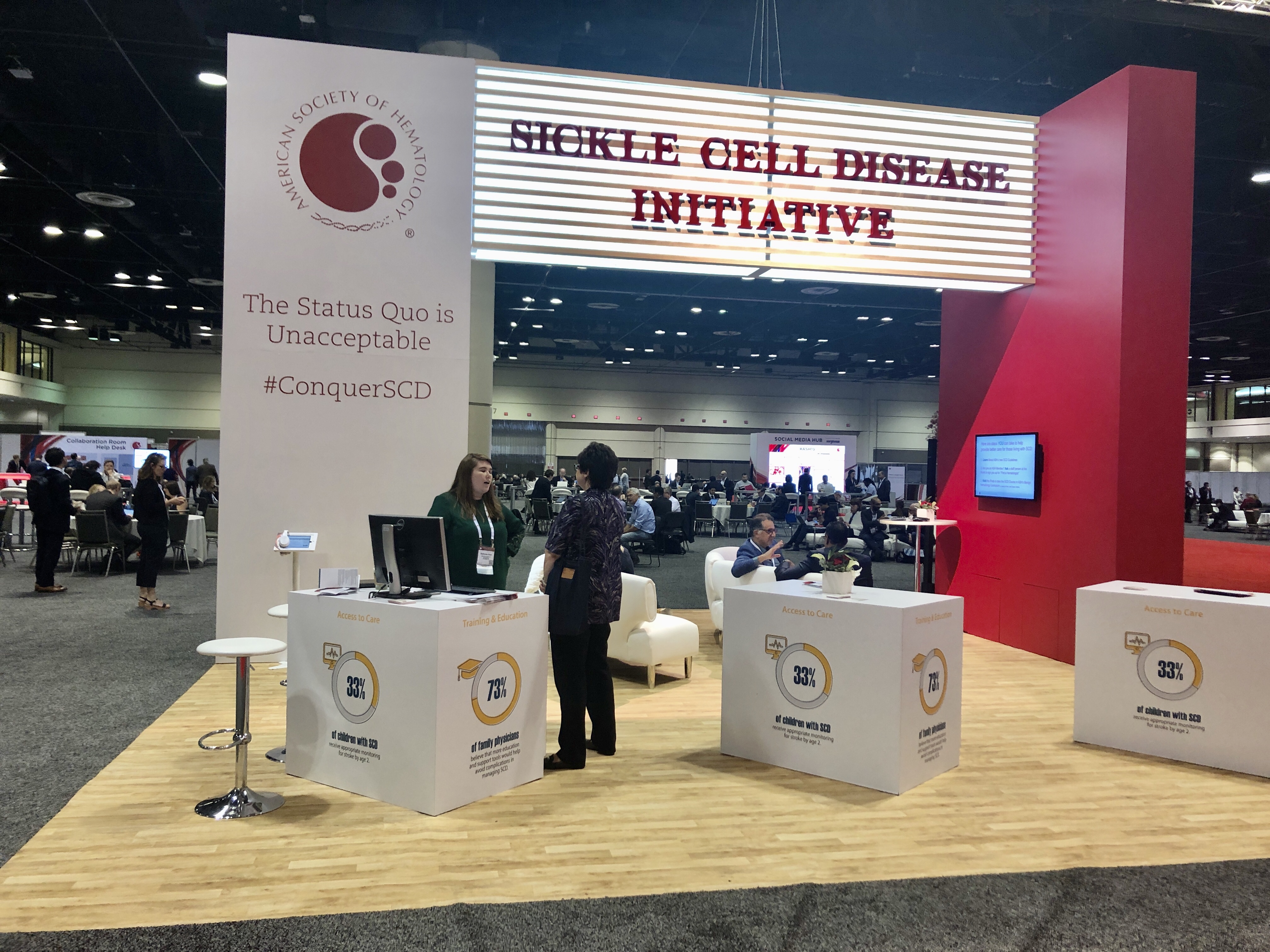SCDC Update
ASH and FDA Unveil New Recommendations to Guide Clinical Development of SCD Therapies
The American Society of Hematology (ASH) has released the most comprehensive set of recommendations to date, aimed at establishing uniformity and global standards for clinical trial endpoints used to evaluate new therapies for sickle cell disease (SCD). The new recommendations – published in two companion papers in the current issue of Blood Advances – are the result of seven expert and patient led panels convened by ASH and the U.S. Food and Drug Administration (FDA) to improve the design of clinical trials for new SCD therapies, including promoting broader use of patient reported outcomes and biomarkers as clinical endpoints.
Papers inBlood Advances:
• End points for sickle cell disease clinical trials: patient-reported outcomes, pain, and the brain
FDA Approves Oxbryta, 1st Treatment Targeting Root Cause of SCD
On Monday, November 25, Oxbryta (Voxelotor), a treatment that directly inhibits sickle hemoglobin polymerization, the root cause of sickle cell disease (SCD), was granted accelerated approval by the United States Food and Drug Administration (FDA). “We are proud to bring this breakthrough therapy to the SCD community. Uniquely developed from inception to treat SCD, Oxbryta embodies Global Blood Therapeutics’ (GBT) commitment to develop and deliver innovative medicines for patients with overlooked, life-limiting chronic diseases. We are grateful to the patients, caregivers, clinical trial investigators, healthcare providers and advocates who have worked alongside us to develop this first-in-class therapy,” said Ted W. Love, MD, President and Chief Executive Officer of GBT. Oxbryta, which was developed by GBT, is the fourth FDA approved drug for SCD. Click here to read the full press release.
ASH’s New Clinical Practice Guideline on Cardiopulmonary and Kidney Disease in SCD
In 2016, the American Society of Hematology (ASH) initiated an effort to develop clinical practice guidelines on sickle cell disease (SCD). ASH appointed 61 clinical experts, five methodologists and 10 patient representatives to review evidence and form recommendations on SCD. The recommendations address treatment of both adult and pediatric SCD and the systematic review of evidence was led by the Mayo Clinic Evidence-Based Practice Center. ASH has published the first chapter of the SCD guidelines on: cardiopulmonary and kidney disease in SCD. In total, five chapters will be published with the remaining four chapters scheduled to be published in the first quarter of 2020. Learn more about these guidelines, the development process, and find additional resources by visiting hematology.org/SCDguidelines.
ASH’s 61st Annual Meeting Recap
The American Society of Hematology (ASH)’s 61st Annual Meeting and Exposition took place December 7-10, 2019, in Orlando, Florida. The meeting provided an invaluable educational experience and the opportunity to review thousands of scientific abstracts, highlighting updates and exciting developments in the hottest topics in hematology, including sickle cell disease (SCD). In addition to sessions and abstracts, this year’s meeting featured a SCD Kiosk where attendees could view ASH’s SCD curriculum for fellows, learn about ASH’s SCD initiative, hear five minute rapid fire SCD presentations on ASH’s new SCD Guidelines, and sign up for ASH’s Find a Hematologist portal – a tool designed to help patients locate hematologists in their area. For a SCD roundup at the ASH Meeting, click here. For those who missed a session or two, they are now available for purchase on ASH on Demand. Additionally, three studies presented during the Meeting highlighted efforts to offer better treatments and more comprehensive care for people living with SCD. An overview of these studies and the late breaking abstract on encouraging results seen with a novel approach to gene therapy for SCD, will be published in easy to understand language in a future SCDC Update.

First Industry Datasets Submitted to ASH Research Collaborative Data Hub
The ASH Research Collaborative (ASH RC) has collaborated with two industry leaders, Novartis and Amgen, to include de-identified patient data from three separate studies of nearly 500 patients living with Sickle Cell Disease (SCD) and more than 1,000 patients with multiple myeloma as part of an unprecedented data sharing initiative. Novartis and Amgen are the first two pharmaceutical companies to provide datasets to the growing collection of data in the ASH RC Data Hub, a platform designed to accelerate scientific discovery by gathering clinical data on rare blood diseases. Click here for more information.
SCD Training and Mentoring Program (STAMP)
Many adults living with sickle cell disease (SCD) have challenges accessing care due to a national shortage of SCD-trained hematologists. To help address this gap, the Health Resources and Services Administration is collaborating with the U.S. Department of Health and Human Services’ Office of Minority Health to deliver a new telehealth series for primary care providers called STAMP, the SCD Training and Mentoring Program. This series, taught by hematologists using a case study-based, tele-mentoring approach, will cover the basics of SCD care, such as pain management, hydroxyurea, and preventive services. Participating primary care providers will also be eligible to request on-demand consultative services from hematologists to further support patient care. The next trainings are scheduled for January 2020. Learn more here.
CDC’s Sickle Cell Data Collection (SCDC) Program Announcements
• SCDC Data Brief: Hydroxyurea Use Among Medicaid Beneficiaries with Sickle Cell Disease in California and Georgia, 2006–2016: shows that during an 11-year period, the use of hydroxyurea (HU) among Medicaid beneficiaries with sickle cell disease (SCD) who lived in California or Georgia increased. However, many beneficiaries with severe complications of SCD do not use HU.
• SCDC Brief: Access to Care for Children: examines geographical access to specialized care, based upon a one-hour drive radius to either daily or periodic specialty care clinics.
• MAPS: The Geography of Sickle Cell Disease in Georgia: maps that allow users to hover over an area or marker for data on SCD births in Georgia, 2004-2016.
• CDC’s new videos feature people with SCD of diverse backgrounds who share that SCD can affect anyone, no matter what you look like or where your family comes from:
- “Sickle Cell Has Many Faces.” (for a general audience)”
- A Message for Healthcare Providers: Sickle Cell Has Many Faces.”
• Mimi’s Story: mentions that throughout her life, healthcare providers have doubted Mimi when she told them she has SCD. This has caused delays in Mimi getting the treatment she needs.
2019 Year-End ASH Advocacy Efforts Related to SCD
The American Society of Hematology (ASH) continues to work with federal agencies and the U.S. Congress to help enhance and expand government activities in sickle cell disease (SCD) research, training, and services. ASH is working with congressional champions to raise awareness for SCD on Capitol Hill and to have legislation introduced to strengthen current federal SCD programs. ASH and the Society’s advocates took a number of steps in 2019 to advance the Society’s SCD-focused advocacy agenda. For more information, click here.

Funding Opportunity on Improving Transition Care
A new Funding Opportunity Announcement (FOA) from Agency for Healthcare Research & Quality will test promising health information technology solutions to improve communication and care coordination during care transitions. Poorly managed transitions can lead to costly, unsafe, and low-quality care. This FOA: PA-20-068 “Improving Quality of Care and Patient Outcomes During Care Transitions (R01),” focuses on improving care transitions between multiple providers and different institutional care settings with a focus on patients, their families, and communities. Applications will be accepted on a rolling basis; the first due date is February 5. Learn more, here.
Cure Sickle Cell Initiative
The Cure Sickle Cell Initiative (CureSCi) was created by the National Institute of Health (NIH)’s National Heart, Lung and Blood Institute (NHLBI) in 2017 and was formally launched in September 2018 to accelerate the development of curative genetic therapies for sickle cell disease (SCD) within the next 5-10 years. The Initiative’s membership is comprised of NIH and NHLBI stakeholders, members of the patient and advocacy communities, industry, academia, and other federal partners. CureSCi is approaching the challenge of finding a cure through multiple avenues, one of which is by establishing common data elements (CDEs) in cooperation with the CureSCi’s Data Consortium and other investigators/partners that have been working in this space for some time. By reviewing and curating the data elements from previous SCD clinical studies with consideration for common endpoints and outcomes, the Initiative is seeking to establish “common data elements” (CDEs). Once defined, these CDEs will be included in future NHLBI funded clinical trials. This approach will promote consistency in future data collection and improve data harmonization for cross-study comparisons and analysis. It will also speed investigators’ timelines to be able to focus on the significant questions and to better leverage knowledge from prior studies. Further information is available at the Initiative’s website: https://curesickle.org/.
Help Raise Awareness for Blood Donation in January
January is National Blood Donor Month, a month to focus on celebrating those blood donors who save lives and to inspire friends and family to become blood donors. Blood transfusions are one of the most critical treatments for the 100,000 Americans living with sickle cell disease. It is essential to have a robust supply of compatible red cells ready; the best supply source has been found to come from those of similar race and ethnic backgrounds. However, only five percent of blood donors are of African ancestry. It is time for this to change. How can you help in January? Share these marketing materials and resources from ADRP, an International Division of America’s Blood Centers, throughout the month of January and encourage your constituents to spread awareness of the need for blood. Blood has an expiration date and needs to be continuously donated to ensure a robust supply is maintained.

Upcoming SCD Events
4th Global Congress on SCD
On April 7-9, 2020, the 4th Global Congress on Sickle Cell Disease will take place at the United Nations Educational, Scientific and Cultural Organization Headquarters in Paris, France. Stay tuned for more information.
Foundation for Sickle Cell Disease Research Symposium
The Foundation for Sickle Cell Disease Research (FSCDR) is committed to supporting innovative research in sickle cell disease (SCD) to help maximize quality of life and improve survival for the generations of people affected by SCD. The next annual FSCDR symposium will take place on June 12-14, 2020, in Fort Lauderdale, FL. Learn more and register today.

Spread the Word
The status quo is unacceptable & we are setting out to change it. Join us to #ConquerSCD! www.scdcoalition.org